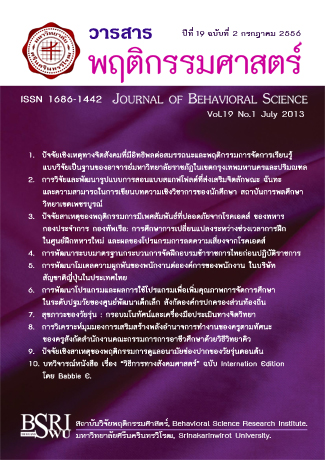การพัฒนาโมเดลความผูกพันของพนักงานต่อองค์การของพนักงาน ในบริษัทสัญชาติญี่ปุ่นในประเทศไทย
Abstract
The Development of Employee Engagement Model of Employees Working in Japanese Company in Thailand
Abstract
The purpose of this study aimed to test the consistency of employee engagement model by using empirical data. The study sample consisted of 225 employees who worked in a Japanese company located in Amata Nakorn Industrial Estate, Chonburi. The studied variables can be divided into 6 main variables: job fit, affective commitment, psychological climate, employee engagement, discretionary effort, and intention to turnover. Survey questionnaires were used. The study results found that the employee engagement model developed for employees working in Japanese companies in Thailand was consistent with empirical data. Goodness of fit statistics were: chi-square test = 8.03, df = 5, p = 0.15, GFI = 0.99, AGFI = 0.95, CFI = 1.00, and RMSEA = 0.052. The variables in the hypothetical model accounted for 78 percent of the total variance of result of employee engagement. Variables having a statistically significant positive direct effect on result of employee engagement were job fit, affective commitment, and psychological climate. Employee engagement also had positive direct effect on discretionary effort. On the other hand, employee engagement had negative direct effect on the intention to turnover. The study results also found that job fit, affective commitment, and psychological climate had statistically significant indirect effects on discretionary effort, and intention to turnover through employee engagement. The signs on those indirect effects were positive and negative, respectively.
Keywords: Employee engagement, Structural Equation Model, Japanese companies in Thailand
บทคัดย่อ
การวิจัยนี้มีวัตถุประสงค์เพื่อทดสอบความสอดคล้องของโมเดลความผูกพันของพนักงานต่อองค์การที่พัฒนาขึ้นกับข้อมูลเชิงประจักษ์ กลุ่มตัวอย่างในงานวิจัยนี้ คือ พนักงานที่ปฏิบัติงานในบริษัทสัญชาติญี่ปุ่นที่ตั้งอยู่ในนิคมอุตสาหกรรมอมตะนคร จังหวัดชลบุรี จำนวน 225 คน ตัวแปรที่ศึกษามี 6 ตัว ได้แก่ ความเหมาะสมของงาน ความยึดมั่นด้านจิตใจ บรรยากาศด้านจิตวิทยา ความผูกพันของพนักงานต่อองค์การ ความพยายามทุ่มเท และความตั้งใจที่จะลาออก เครื่องมือที่ใช้ในการวิจัย คือ แบบสอบถาม และวิเคราะห์ข้อมูลด้วยโปรแกรม LISREL 8.80 ผลการวิจัยแสดงว่า โมเดลความผูกพันของพนักงานต่อองค์การของพนักงานที่ปฏิบัติงานกับบริษัทสัญชาติญี่ปุ่นในประเทศไทยมีความสอดคล้องกับข้อมูลเชิงประจักษ์อยู่ในเกณฑ์ดี มีค่าไค-สแควร์ เท่ากับ 8.03 ที่องศาอิสระเท่ากับ 5 ค่าความน่าจะเป็น (p) เท่ากับ 0.15 ค่าดัชนี GFI, AGFI และ CFI มีค่าเท่ากับ 0.99, 0.95 และ 1.00 ตามลำดับ และค่า RMSEA เท่ากับ 0.052 นอกจากนี้ ตัวแปรทั้งหมดในโมเดลสามารถอธิบายความแปรปรวนของความผูกพันของพนักงานต่อองค์การได้ร้อยละ 78 และจากการวิเคราะห์ค่าสัมประสิทธิ์อิทธิพลของตัวแปรในโมเดล พบว่า ความเหมาะสมของงาน ความยึดมั่นด้านจิตใจ และบรรยากาศด้านจิตวิทยา มีอิทธิพลทางตรงเชิงบวก ต่อความผูกพันของพนักงานต่อองค์การ และความผูกพันของพนักงานต่อองค์การมีอิทธิพลทางตรงเชิงบวกต่อความพยายามทุ่มเท แต่ในทางตรงกันข้าม ความผูกพันของพนักงานต่อองค์การกลับมีอิทธิพลทางตรงเชิงลบต่อความตั้งใจที่จะลาออกของพนักงาน นอกจากนี้ ความเหมาะสมของงาน ความยึดมั่นด้านจิตใจ และบรรยากาศด้านจิตวิทยา มีอิทธิพลทางอ้อม ผ่านตัวแปรความผูกพันของพนักงานต่อองค์การ มายังความพยายามทุ่มเทของพนักงาน และความตั้งใจที่จะลาออกของพนักงาน โดยเป็นค่าอิทธิพลทางอ้อมเชิงบวก และเชิงลบ ตามลำดับ
คำสำคัญ: โมเดลความผูกพันของพนักงานต่อองค์การที่ปฏิบัติงาน โมเดลสมการโครงสร้าง บริษัทญี่ปุ่นในประเทศไทย
Published
How to Cite
Issue
Section
License
Behavioral Science Research Institute, SWU
114 Sukhumvit 23, Bangkok 10110, Thailand.
Tel.02-649-5000 # 17600


